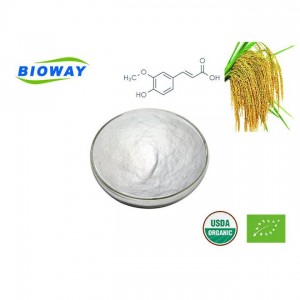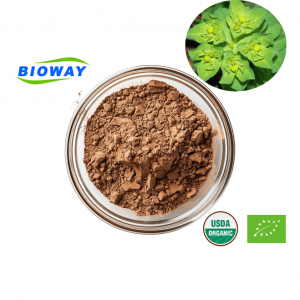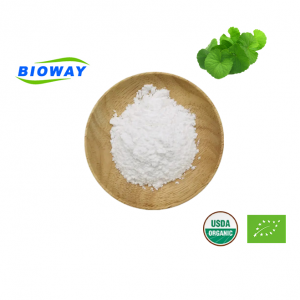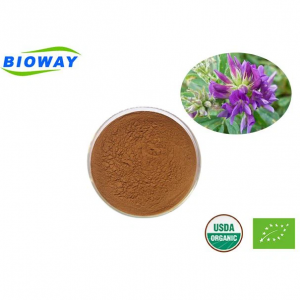Pomegranate Peel Extract Ellagic Acid Powder
Pomegranate Peel Extract Ellagic Acid Powder is a powdered form of natural extract derived from pomegranate peels. Ellagic Acid is the main active ingredient in Pomegranate Peel Extract and is known for its antioxidant properties. It is a polyphenolic compound that can help to fight inflammation, reduce oxidative stress, and protect against cellular damage caused by free radicals. Pomegranate Peel Extract Ellagic Acid Powder can be used in dietary supplements, cosmetics, and other health products to support overall health and wellness. It is also commonly used in skincare products due to its anti-aging and skin-rejuvenating properties.
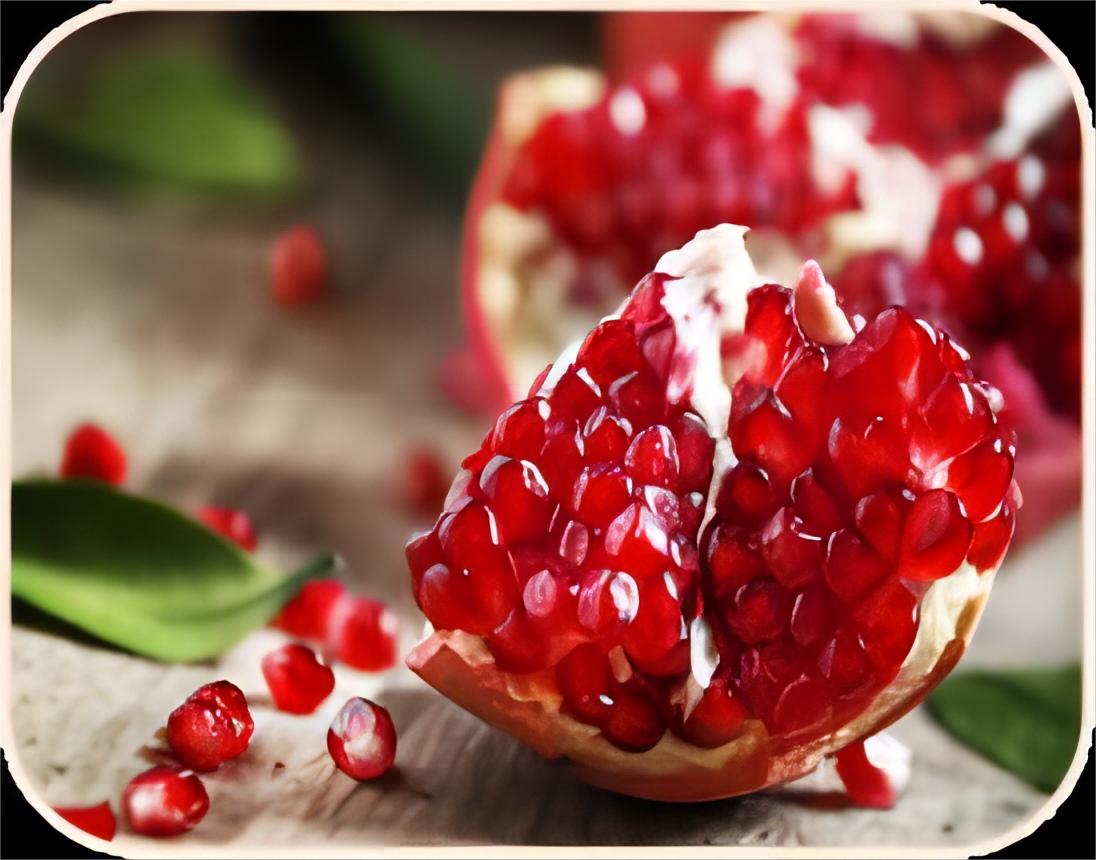
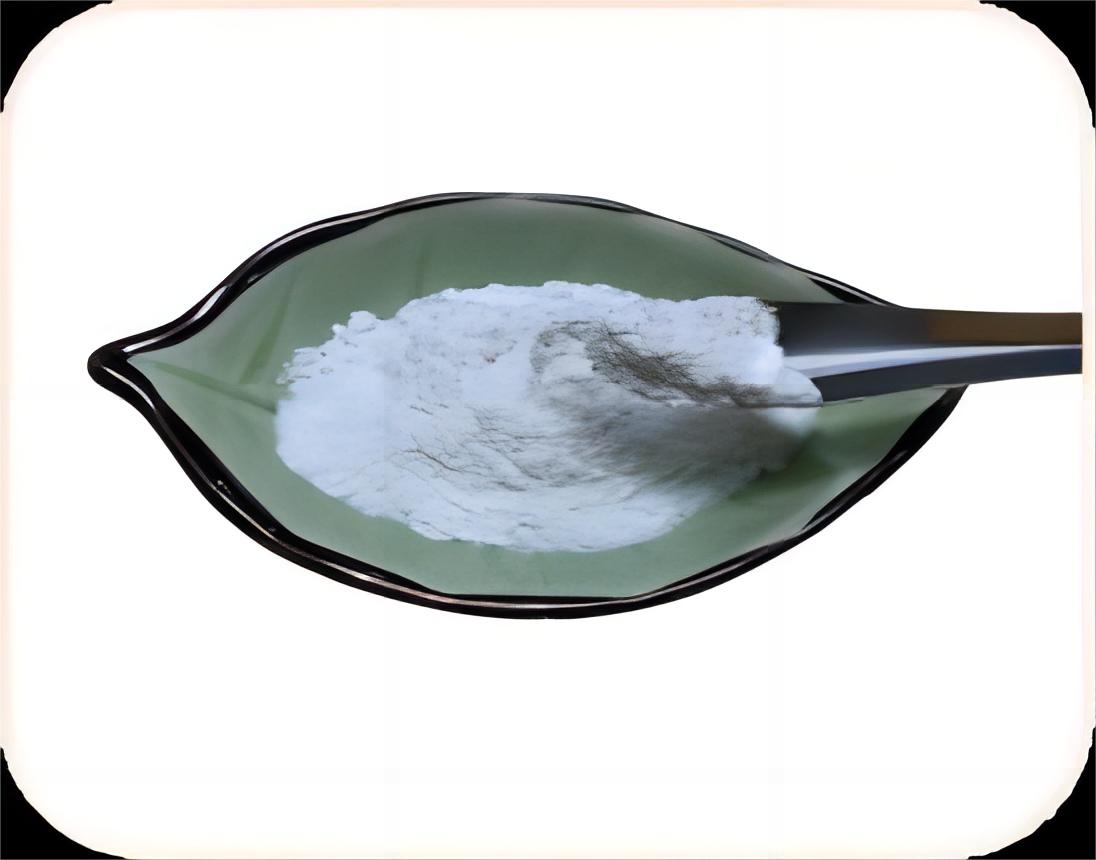
| Product Name | Pomegranate Peel Extract Ellagic Acid Powder |
| Chemical Name | 2,3,7,8-Tetrahydroxychromeno[5,4,3-cde]chromene-5,10-dione; |
| Analysis | HPLC |
| CAS | 476-66-4 |
| Molecular formula | C14H6O8 |
| Extract from | Pomegranate peel |
| Specification | 99% 98% 95% 90% 40% |
| Storage | 2-10ºC |
| The application in cosmetics | 1. Whitening, inhibiting melanin; 2. Anti-inflammatory; 3. Antioxidation |
here are some product selling features of Pomegranate Peel Extract Ellagic Acid Powder:
1.High in Antioxidants: Pomegranate Peel Extract Ellagic Acid Powder is a rich source of antioxidants, specifically ellagic acid, which can help to protect the body against cellular damage caused by free radicals.
2.Natural Ingredient: Pomegranate Peel Extract Ellagic Acid Powder is derived from the peel of the pomegranate fruit, making it a 100% natural ingredient. It is free from synthetic chemicals and additives.
3.Anti-inflammatory Properties: Ellagic acid in Pomegranate Peel Extract Ellagic Acid Powder has anti-inflammatory properties and may help reduce inflammation in the body.
4.Cardiovascular Health: This product may help reduce the risk of heart disease and other cardiovascular conditions due to its ability to lower blood pressure and improve blood flow.
5.Anti-aging Benefits: Pomegranate Peel Extract Ellagic Acid Powder is known for its anti-aging benefits, including its ability to improve skin elasticity and reduce the appearance of fine lines and wrinkles.
6.Immune System Booster: This product can help support the immune system by improving the body's ability to fight off infections and diseases.
7. Brain Health: Ellagic acid in Pomegranate Peel Extract Ellagic Acid Powder may also be beneficial for brain health, including improving memory and cognitive function.
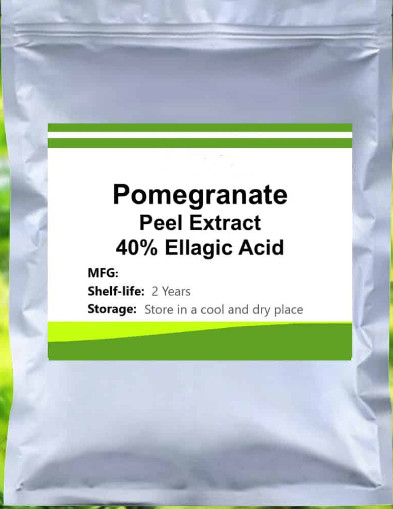
Here is a shortlist of Ellagic Acid Powder product application fields:
1.Dietary supplements: Ellagic Acid Powder is used in various dietary supplements to support overall health and promote antioxidant activity in the body.
2.Nutraceuticals: It is used as an active ingredient in nutraceuticals like antioxidant blends and multivitamins to promote health and wellness.
3.Skincare products: Ellagic Acid powder is used in skin care products due to its anti-aging and skin-rejuvenating properties. It can help to reduce the appearance of fine lines and wrinkles and improve overall skin texture.
4.Cosmetics: It is used in cosmetics to provide antioxidative protection to the skin and helps to prevent oxidative damage.
5.Functional Foods: Ellagic Acid is used in functional foods like energy bars and drinks to promote antioxidant activity and provide health benefits.
6.Animal Feed: It is also used in animal feed to promote overall health and wellness of animals.
7. Pharmaceutical Industry: Ellagic Acid is used in the pharmaceutical industry as a co-ingredient in chemotherapy drugs and anti-tumor drugs.
Here is a basic overview of how to produce Pomegranate Peel Extract Ellagic Acid Powder:
1.Collecting pomegranate peels: Pomegranate peels need to be collected and sorted carefully. They should be clean and free of any dirt or residue.
2.Extraction process: The extraction process involves soaking the pomegranate peels in a solvent such as ethanol or methanol. This helps to extract the ellagic acid from the peels.
3.Filtration: After the extraction process, the solution needs to be filtered to remove any impurities.
4.Concentration: The solution is then concentrated to reduce the volume and increase the concentration of ellagic acid.
5.Drying: The concentrated solution is then dried using a vacuum dryer or spray dryer to convert it into a powder.
6.Packaging: The dried ellagic acid powder is then packaged in airtight containers and stored in a cool, dry place until it is ready to be used.
Note: The exact process may vary depending on the equipment and technology used by the manufacturer.
Storage: Keep in a cool, dry, and clean place, Protect from moisture and direct light.
Bulk Package: 25kg/drum.
Lead Time: 7 days after your order.
Shelf Life: 2 years.
Remark: Customized specifications also can be achieved.

Express
Under 100kg, 3-5Days
Door to door service easy to pick up the goods
By Sea
Over300kg, Around 30 Days
Port to port service professional clearance broker needed
By Air
100kg-1000kg, 5-7Days
Airport to airport service professional clearance broker needed

Pomegranate Peel Extract Ellagic Acid Powder is certified by USDA and EU organic, BRC, ISO, HALAL, KOSHER and HACCP certificates.

Ellagic acid is generally considered safe and has a low toxicity level. However, there are some potential disadvantages or side effects associated with its use: 1. Digestive issues: High doses of ellagic acid may cause stomach upset, nausea, diarrhea, and vomiting. 2. Interference with nutrient absorption: Ellagic acid can bind to minerals like iron and reduce their absorption in the body. 3. Allergic reactions: Some people may be allergic to ellagic acid, which can cause skin rashes, hives, and difficulty breathing. 4. Drug interactions: Ellagic acid can interact with certain medications, including chemotherapy drugs, blood thinners, and antibiotics, which can affect their effectiveness. It's important to moderate your intake of ellagic acid and consult with your doctor or healthcare provider before taking any supplements or using products that contain the acid.
Ellagic acid is commonly found in fruits and vegetables, particularly in berries such as raspberries, strawberries, blackberries, and pomegranates. Other rich sources of ellagic acid include walnuts, pecans, grapes, and some tropical fruits like guava and mango. Additionally, ellagic acid can also be found in some herbs and spices, including cloves, cinnamon, and oregano.
There are a few ways that you can increase your intake of ellagic acid: 1. Eat more fruits and vegetables: Including plenty of berries, pomegranates, walnuts, pecans, grapes, guava, mango, and other plant-based foods in your diet can increase your overall ellagic acid intake. 2. Juice or blend fruits and vegetables: Juicing or blending fruits and vegetables can make their nutrients more digestible and accessible for your body to absorb, including ellagic acid. 3. Choose organic produce: Conventionally grown fruits and vegetables may contain lower levels of ellagic acid due to the use of pesticides or other chemicals. Choosing organic produce can increase the ellagic acid content. 4. Use spices and herbs: Adding spices like cloves, cinnamon, and herbs like oregano in your food can also increase your ellagic acid intake. However, it's important to note that ellagic acid is just one of many nutrients that are important for overall health and wellbeing, so it's best to focus on eating a variety of nutrient-rich foods rather than just one specific nutrient.




